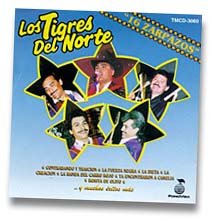
COURTESY IMAGE Tigers boast
a mighty roar
THE music is similar to country for its slice-of-life subject matter, shaded ever so slightly by the pervasive influence of "rock en Español," and proudly Mexican to the core. It's called norteño, and Jorge Hernandez, leader and spokesman of Los Tigres del Norte, says the term stuck because of the prominence given to the accordion and other instruments commonly associated with the traditional music of northern Mexico.
Los Tigres del Norte
Where: Kapono's, Aloha Tower Marketplace
When: 6:30 p.m. tomorrow
Tickets: $45 general, $100 VIP; available at Los Garcias Restaurant (261-0306), Hola Hawaii Productions (947-0828), Centro Hispano de Hawaii (941-5216) and El Palenque Mexican Restaurant (622-5829)
Ages: 21 and over
Call: 947-0828
"People call it that because they got used to it, but (our) music has been changing. Before, they used to do polkas with it, but now we do all kinds of stuff -- rock, ballads and different types of stuff with it," Hernandez explained as the band waited for a flight yesterday from the Big Island to Honolulu.
Los Tigres (the full name translates into English as "The Tigers of the North") are stopping off in Hawaii on their way back to the mainland from Korea and Japan. Their concert at Kapono's tomorrow should be a "must see" for anyone with an interest in world music.
While the band is little known outside the English-speaking mainstream, within Mexican communities Los Tigres are superstars, and one of the biggest acts in Spanish-language pop music.
Hernandez describes norteño music as similar to country music because they share the similar subject matter of documenting the lives of everyday working-class people. Many contemporary corridos describe the hard lives and rough times experienced by Mexicans living near the Mexican-American border or as immigrants in the states.
The band has recorded corridos about the lives of drug smugglers and mojados (wetbacks), gun battles between narcos and the police, and the impact of corrupt politicians and political assassinations on Mexican society.
The band has also touched many hearts with corridos that express the mixed emotions many immigrants feel, even if they're now legal residents in gringolandia (the United States). Some reflect the fear that their children speak English more fluently than Spanish and reject their Mexicanidad (a term that can be translated as "Mexicanness"). Others have pondered, in ironic terms, what might happen to the American economy if all the mojados were suddenly rounded up and the border sealed so tightly that no more illegal immigrants could enter.
"We always tell the stories that happen in real life. They can be about husbands and wives (or) sons and daughters," Hernandez said, explaining that the group doesn't seek to glorify violence or criminal activities, but can't ignore them either.
Los Tigres has changed the sound of norteño music as well. Anglos hearing it for the first time will notice the prominence of the accordion and perhaps the sound of the 12-string bajo sexto. Hernandez says the latter instrument is "not the same as guitar or bass (and) is played in different keys ... the sound is a little more bassy than the guitar."
Concerning the band's history, Hernandez says that he and his brothers were only looking to make a little money when they crossed the border in 1968 to play a gig in San Jose, Calif. Their father was ill and they wanted to raise money for his medical bills. An older Mexican couple helped them out at the border by pretending to be their parents. An immigration officer referred to the boys as "little tigers," and since they were going north, they dubbed themselves Los Tigres del Norte.
The promoter persuaded them to play a second gig that happened to be broadcast on a local radio station. A record distributor heard them, offered them a record deal, and became their personal mentor. Among the changes he suggested was using a full drum set and electric bass -- revolutionary ideas for a young norteño band.
They were still living in San Jose four years later when Hernandez heard a nightclub singer's version of "Contrabando y Traicion (Contraband and Betrayal)" and asked permission to record it. Los Tigres' take on the life and death of a marijuana smuggler became their breakthrough hit.
Many hit songs and hit albums later, the band's discography includes a 1988 Grammy for Best Mexican Regional Album and a 2000 Latin Grammy for Best Norteño Album.
Click for online
calendars and events.


